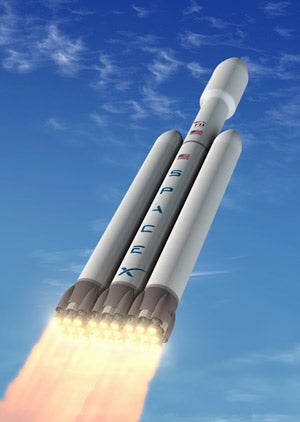Space privateers to launch biggest rocket since 70s

Your support helps us to tell the story
From reproductive rights to climate change to Big Tech, The Independent is on the ground when the story is developing. Whether it's investigating the financials of Elon Musk's pro-Trump PAC or producing our latest documentary, 'The A Word', which shines a light on the American women fighting for reproductive rights, we know how important it is to parse out the facts from the messaging.
At such a critical moment in US history, we need reporters on the ground. Your donation allows us to keep sending journalists to speak to both sides of the story.
The Independent is trusted by Americans across the entire political spectrum. And unlike many other quality news outlets, we choose not to lock Americans out of our reporting and analysis with paywalls. We believe quality journalism should be available to everyone, paid for by those who can afford it.
Your support makes all the difference.The space race is no longer just between nations. Space X, a private firm based in California, has stolen a march on Nasa by unveiling plans to launch the most powerful private rocket ever built.
Named Falcon Heavy, the new rocket can carry more cargo than a fully-laden Boeing 737 aircraft and does not only exist in blueprint form – it promises to be complete by the end of next year. It will be the the largest rocket since the Apollo-era Saturn V.
In 2010 Space X stunned the world after it became the first private company to launch a craft that orbited the Earth twice and landed safely within just three hours. Its founder Elon Musk, the American engineer-turned-entrepreneur who made his fortune after co-founding the global online payment system PayPal, promises that Falcon Heavy will bring "revolutionary change, not evolutionary change" to the field of space exploration. "The public should be very excited about this. It re-establishes US leadership in space," he said.
The announcement comes at a crucial time for US space missions, which have been in a state of flux since Barack Obama finally called time on Nasa's long-running space shuttle programme. "America's infamous space agency is currently depending on Russian Soyuz rockets for its missions," said Tim Horbury, professor of physics at Imperial College London. "That is not a great position for it to be in."
President Obama recently announced a $6bn (£3.6bn) plan to help private firms develop reliable and affordable rocket launchers to transport cargo and US astronauts into space. Nasa has also signed contracts with several private firms, including a $1.9bn deal with Orbital Space Corporation for eight launches of its Taurus II rocket, scheduled to take place next year.
Space X has become known and admired for the speed and efficiency of its products. "Private firms have been making inroads into this market ever since 2002, but very few are doing it quite as logically and cheaply," said Professor Horbury. "It backs its own ambition and has an extremely tight focus of development that means each new model is a clever extension of the last."
Transporting equipment into space has long been vital for countries with their own space programmes, but the pursuit of this aim has led to many thwarted attempts. The former Soviet Union built a giant moon rocket bigger than Falcon Heavy, which failed in all four of its launch attempts. Another Soviet rocket, again larger than Falcon Heavy, had just one successful flight more than 20 years ago.
"The sheer ability to haul so much gear into space could very well accelerate the time it takes to build bases on the Moon and explore Mars," Professor Horbury added. "It gives spacecraft a higher chance of returning from missions."
After several launches, Mr Musk believes his rockets will be capable of transporting people – although such a hobby is likely to be the preserve of the super-rich, given that each launch costs an estimated $100m. But if the project helps to resurrect America's standing as the world leader in space exploration, many would argue that $100m a try is a small price to pay.
Join our commenting forum
Join thought-provoking conversations, follow other Independent readers and see their replies
Comments